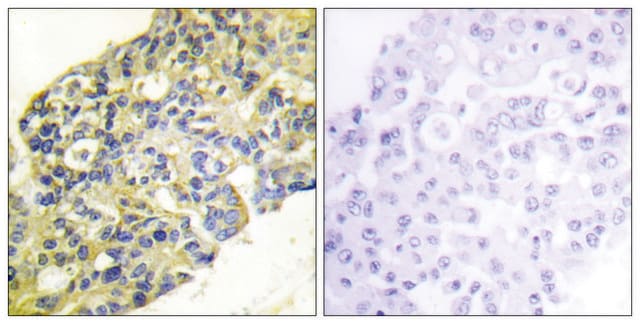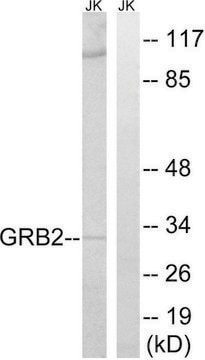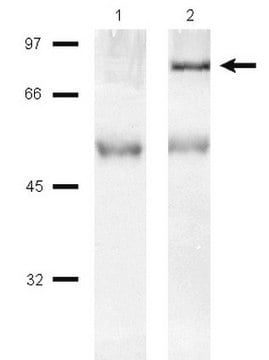05-212
Anti-PI3 Kinase Antibody, p85, N-SH3, clone AB6
clone AB6, Upstate®, from mouse
Sinónimos:
PI3-kinase p85 subunit alpha, PtdIns-3-kinase p85-alpha, phosphatidylinositol 3-kinase, regulatory subunit, polypeptide 1 (p85
alpha), phosphatidylinositol 3-kinase, regulatory, 1, phosphatidylinositol 3-kinase-associated p-85 alpha, phosphoinos
About This Item
Productos recomendados
biological source
mouse
Quality Level
antibody form
purified antibody
antibody product type
primary antibodies
clone
AB6, monoclonal
species reactivity
human, rat, mouse
manufacturer/tradename
Upstate®
technique(s)
immunocytochemistry: suitable
immunoprecipitation (IP): suitable
western blot: suitable
isotype
IgG1κ
NCBI accession no.
UniProt accession no.
shipped in
wet ice
target post-translational modification
unmodified
Gene Information
human ... PIK3R1(5295)
General description
Specificity
Immunogen
Application
10 µg/mL of a previous lot of this antibody was used in immunocytochemistry.
Immunoprecipitation:
4 µg of a previous lot immunoprecipitated PI3 Kinase from 500 µg of an A431 RIPA lysate, as confirmed by immunoblot using a polyclonal PI3 Kinase antibody (Catalog # 06-195).
Signaling
PI3K, Akt, & mTOR Signaling
Kinases & Phosphatases
Quality
Western Blot Analysis:
0.5-2 µg/mL of this lot detected PI3 Kinase in RIPA lysates from human A431 cells; previous lots detected PI3 Kinase in RIPA lysates from rat L6 myoblasts.
Target description
Linkage
Physical form
Storage and Stability
Handling Recommendations:
Upon receipt, and prior to removing the cap, centrifuge the vial and gently mix the solution. Aliquot into microcentrifuge tubes and store at -20ºC. Avoid repeated freeze/thaw cycles, which may damage IgG and affect product performance. Note: Variability in freezer temperatures below -20ºC may cause glycerol-containing solutions to become frozen during storage.
Analysis Note
Positive Antigen Control: Catalog #12-301, non-stimulated A431 cell lysate. Add 2.5µL of 2-mercaptoethanol/100µL of lysate and boil for 5 minutes to reduce the preparation. Load 20µg of reduced lysate per lane for minigels.
Other Notes
Legal Information
Disclaimer
¿No encuentra el producto adecuado?
Pruebe nuestro Herramienta de selección de productos.
Storage Class
12 - Non Combustible Liquids
wgk_germany
WGK 2
flash_point_f
Not applicable
flash_point_c
Not applicable
Certificados de análisis (COA)
Busque Certificados de análisis (COA) introduciendo el número de lote del producto. Los números de lote se encuentran en la etiqueta del producto después de las palabras «Lot» o «Batch»
¿Ya tiene este producto?
Encuentre la documentación para los productos que ha comprado recientemente en la Biblioteca de documentos.
Nuestro equipo de científicos tiene experiencia en todas las áreas de investigación: Ciencias de la vida, Ciencia de los materiales, Síntesis química, Cromatografía, Analítica y muchas otras.
Póngase en contacto con el Servicio técnico








